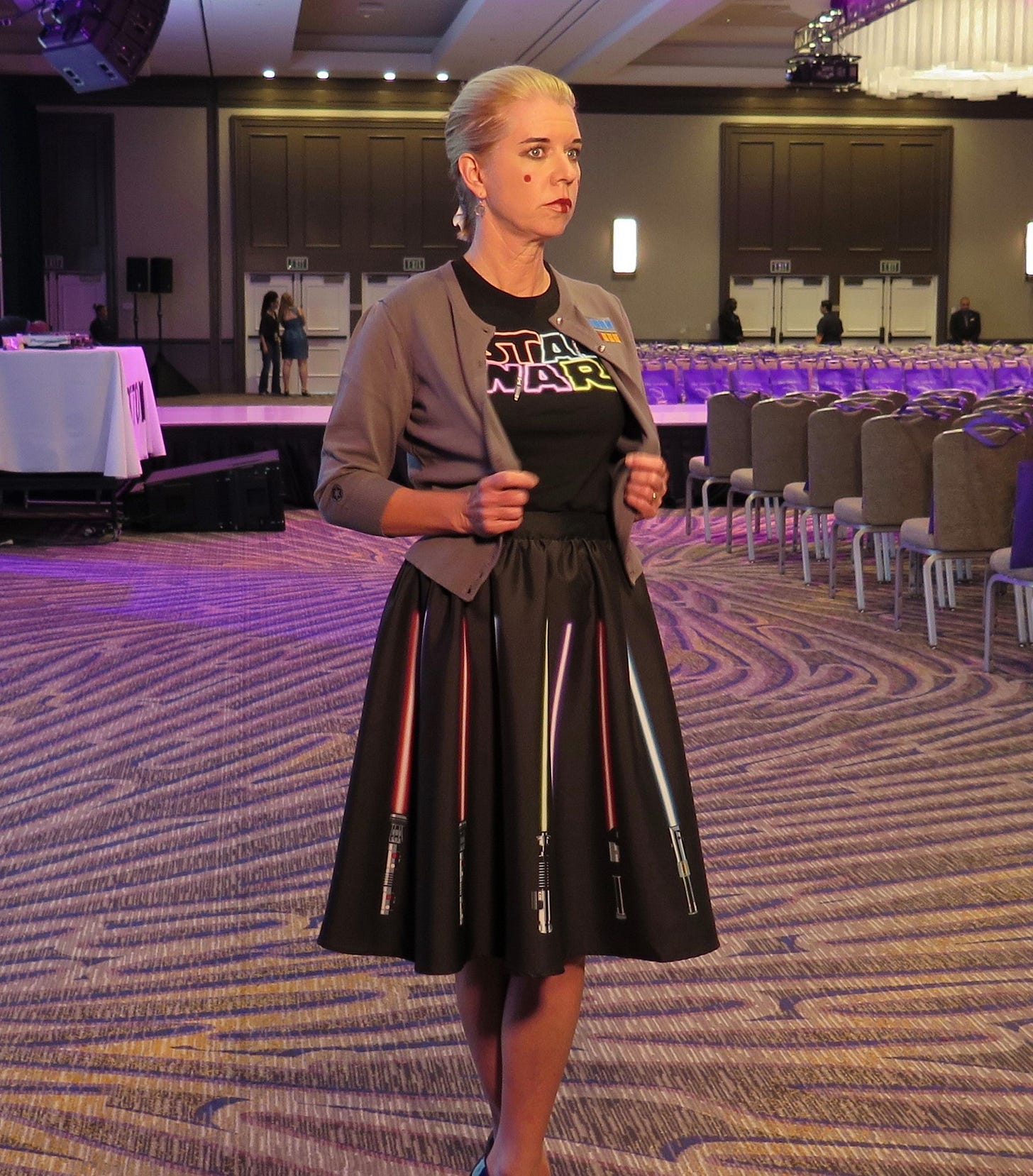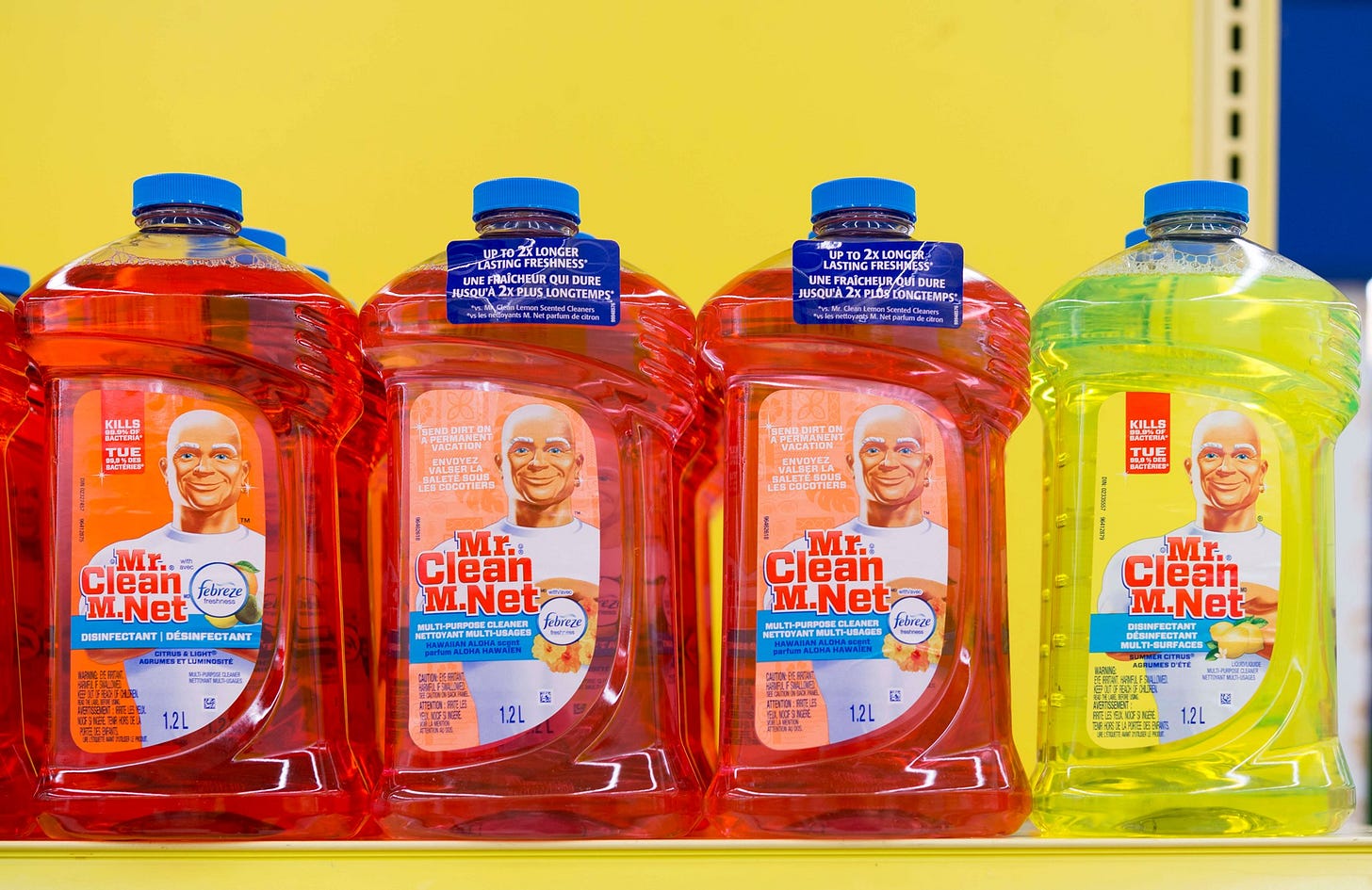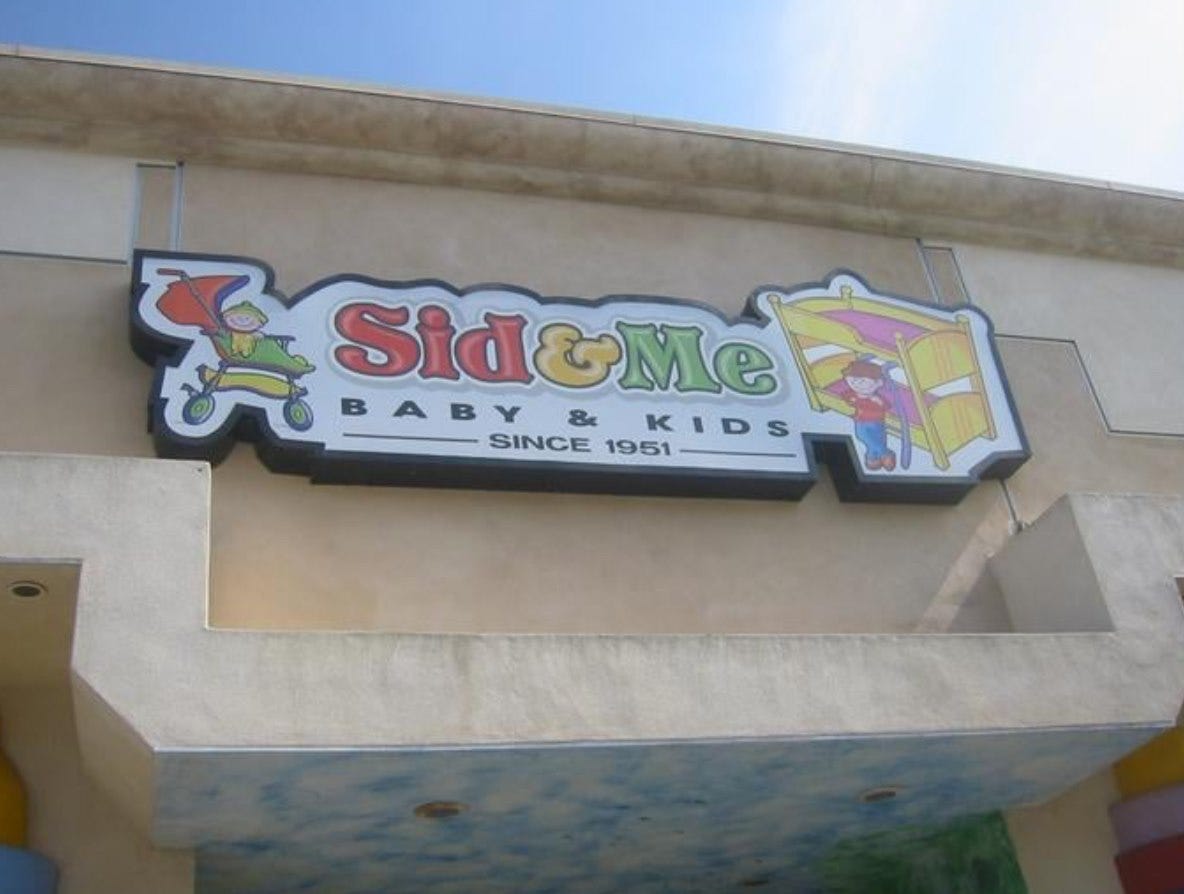
Xerox. Kleenex. Apple. Starbucks. Target.
Millions of dollars are spent to find the right name. An entire industry exists to research and create brands which convey strength, or fun, or hope. They may even describe the product.
Think Mr. Clean. To me, the name says it all.

Image: Roberto Machado Noa/Getty Images
Sometimes, however, brand names are not only irrelevant but laughably bad. Someone got paid to come up with iSnack 2.0?
This week we’ve seen two new brands emerge. The Squaw Valley Ski Resort has a new name which is no longer offensive to Native Americans but remains offensive for still being stupid. The resort is now Palisades Tahoe, which sounds like someone threw several non sequiturs into a Bingo machine and put together the first two which popped out.
Then there’s the merger of Canadian Pacific Railway and Kansas City Southern. Dow Jones reports the new railway will be called (big inhale) Canadian Pacific Kansas City. I prefer Can-Kan.
“There are three rules when it comes to a brand name,” says Robert Klara, who covers brands for AdWeek. First, “They have to be memorable.” Klara says names also have to be meaningful, “which is usually where everything kinda goes south,” and they have to be ownable; in other words, easy to trademark. That last element can be tricky in an age where so many internet domain names are already taken (it’s also why so many brands are intentional misspellings, like TikTok).
Klara points to a couple examples of companies squandering fortunes to come up with a new name. In 1997 USAir spent $40 million to rebrand itself. “They went from being USAir to US Airways,” Klara says. “I’ll leave it up to people to decide if that was worth the money.”
The second story is from the 1950s, when Ford hired an agency to name a new car. “They wanted a really splashy name for this thing,” Klara tells me. The ad agency responded with 18,000 suggestions. Ford executives didn’t like any of them, so they brought in poet Marianne Moore for more inspiration. She provided a long list of names, including “The Utopian Turtletop.” Nope.
In the end the company named the car after Henry Ford’s son.
Edsel.
The worst of the worst?
This week I asked many of you who follow me on social media to nominate the dumbest brand decisions ever, and you did not disappoint. I’ve received an embarrassment of riches. Emphasis on embarrassment.
Here are my top 12 candidates for Worst of the Worst. Voting is being done in three rounds on Twitter. (See below for links.)
And the nominees are:
Allegis
Back in 1987, United Airlines CEO Richard Ferris envisioned a company bigger than airplanes. He spent billions acquiring Hertz and Hilton and rebranded the company Allegis. “We are a travel company, not just a transportation company,” he said.
The new name was supposed to evoke thoughts of “allegiance,” or loyalty.
Wall Street didn’t like the name or the strategy. Shareholder Donald Trump reportedly quipped that Allegis sounded like “the next world-class disease.” (He used to be very funny.)
Both Ferris and the Allegis name were gone within months, proving that allegiance on Wall Street only goes so far.
Alphabet
You will always be Google. Your ticker symbol is still GOOG, because you’re... Google. But the billionaire boys who created Google decided in 2015 to name the company Alphabet and make Google just one division of a far-flung enterprise.
Google co-founder Larry Page wrote, “We liked the name Alphabet because it means a collection of letters that represent language, one of humanity’s most important innovations, and is the core of how we index with Google search!” The name was also a play on “alpha-bets,” meaning “investment return above benchmark.”
Page finished by saying, “Don’t worry, we’re still getting used to the name too!”
Don’t worry, six years later, so are we.
Altria
When you create a product that kills millions of customers, and you lie about it, leading to billions of dollars in legal settlements, you’d best rebrand yourself.
Nothing says, “Veni, vidi, vici!” more than throwing in a little Latin. Latin roots are big in branding, which Klara finds interesting, “because most people don’t speak Latin.”
Philip Morris renamed itself “Altria” in 2001. New name, same cancer.
Altria is reportedly based on the Latin word “altus,” which means “to reach higher.” Klara wonders how many people know that.
“I would suggest zero.”
Ayds
They used to sell “candy” to make you lose weight. Then a disease came along which did the job far too well.
Ayds diet products didn’t have a branding problem until the AIDS crisis of the 1980s. Taglines like, “With Ayds, I ate less, so the weight came off,” suddenly seemed heartless as tens of thousands of Americans were dying.
What’s dumb is that the company insisted on sticking with the name even as sales plummeted. Klara says in 1986 a company vice president told a reporter, “The product has been around for 45 years, let the disease change its name.”
By the late ‘80s, Ayds was sold to a new company. The product was rebranded as Aydslim, which sounds like a neurological disorder. The new name fooled no one, sales continued to fall, and Ayds is no more.
Bimbo Bakeries
The Mexico-based Bimbo Bakeries realized it faced a branding hurdle when it greatly expanded in the U.S. in 2010. Never mind that “Bimbo” has no meaning in Spanish.
To overcome consumer reluctance to buy bread named after idiots, Bimbo hatched the idiotic idea of putting up billboards telling everyone to pronounce it “beembo.”
Kum & Go
I thought this might be an intentional double entendre, but I don’t think so. The large chain of gas and convenience stores in the Midwest got its name from its two founders, William Krause and Tony Gentle, who used their initials, K and G, to create a play on “Come & Go.”
On the other hand, I’m pretty sure the family behind Passmore Gas knows exactly what they’re doing.
Monday
Who loves Monday? Nobody.
PwC renamed its consulting business “Monday” back in 2002 and planned to spend over $100 million in a rebranding campaign. One. Hundred. Million. Dollars.
But Monday didn’t last too many Mondays. Faster than you can say PricewaterhouseCoopers, IBM announced it was buying PwC, and everything was brought under the Big Blue brand.
The branding faux pas is considered PwC’s biggest blunder until 2017, when its auditors handed Faye Dunaway and Warren Beatty the wrong Best Picture envelope at the Oscars.
Mondelez
First, it’s difficult to pronounce. Second, the name sounds like an orc tavern in Mordor.
Mondelez is the name Kraft Foods created when it spun off its snack division in 2012. “It’s still kind of a head scratcher to me because Kraft Foods was such an identifiable brand name,” says Klara.
The name is a mashup of “monde,” the French word for “world,” and “delez,” which is supposed to make you think of “delicious.”
One thing “Mondelez” does not make you think of is Oreos or Trident gum, the very products it sells.
The name was reportedly selected from more than 1,700 submissions by employees, so at least it didn’t cost much.
Qwikster
Remember the olden days when Netflix CEO Reed Hastings was trying to convince investors and customers that streaming was the future? In 2011, he actually split the company in two, separating the physical DVD business from the fledgling streaming business, rebranding the DVD side Qwikster, even though it would not be quicker than streaming.
Customers went ballistic. Two accounts? Two things to pay for? Netflix lost 800,000 subscribers and the stock tanked. “It makes my blood pressure rise to think of it,” says Robert Klara, ten years later.
Hastings, who is generally not an idiot, qwit Qwikster qwikly.
“Qwikster was a dumb idea. Dumb, dumb, dumb,” Jason Gilbert wrote in HuffPo at the time. “It should certainly be a first ballot entrant into the Bad Decision Hall of Fame, enshrined next to New Coke, Prohibition and that time Garth Brooks dyed his hair black and played rock music under the name Chris Gaines.” (Oh man, I forgot about Chris Gaines.)
Slack
Early on, there were doubts that Slack would be a good name for anything, let alone an internal communications platform. But Slack founder Stewart Butterfield wanted a better code name than “linefeed,” and “Slack” had one thing going for it. It was an acronym, or “backronym,” for “Searchable Log of All Conversation & Knowledge.”
Butterfield posted a tweet showing the moment he came up with the name and shared it with someone named Eric, who replied, “I like it, but… it has kind of negative connotations, too. Our users would be Slackers :)”
Stewart then replied, “ta da!”
But what do I know? Slack was acquired by Salesforce this year for almost $28 billion. Ta da!
Stellantis
Another calamitas! (Latin for “disaster.”) Stellantis is the new name for the merger this summer of Fiat Chrysler and Peugeot. The combined company says Stellantis is based on the Latin verb “stello,” meaning “to brighten with stars.” They came up with the name with the help of Publicis Groupe, a name I present without comment.
Verizon
Doesn’t seem like a big deal now, but this was confusing back in 2000 when Bell Atlantic merged with GTE and renamed itself Verizon. At first, nobody knew how to pronounce it, including me. I kept saying, “VER-uh-zun.”
The name combines “veritas,” which is Latin for truth, and the word “horizon.” Stop with the Latin, puh-leeeeez. Can you hear me now?
Honorable mentions:
Truist
Truist is the bullsh*tist new name given to the merger of BB&T and SunTrust, two very well established brands that didn’t need a makeover. Just pick one.
Nissan
What was wrong with Datsun? Nothing.
Soylent
This is an actual food product that replaces meat. It’s made from plants, not humans. But the company doesn’t seem to mind the confusion.
Sid’s Baby Furniture
Sid & Me sold cribs — cribs — in Los Angeles for many years — with a name that’s the acronym for Sudden Infant Death Syndrome. Sid’s finally closed, only to be replaced by a restaurant called Sustainabowl, which sounds like it serves a daily special of recycled plastic.

New Coke
Not a dumb name, just a dumb product.
Here are two tongue twisters:
We have to mention the pharmaceutical industry:
Comirnaty
This is indicative of all the money wasted on branding in Big Pharma. Comirnaty is the unpronounceable, incomprehensible name which Pfizer has given its Covid vaccine.
Speaking of Big Pharma, here’s one name change I support.
Isis Pharmaceuticals
The company finally renamed itself Ionis in 2015, more than a dozen years after the war on terror began. Not sure why it took so long.
By the way…
What brand name does Robert Klara think has worked incredibly well?
Tiffany & Co., which was founded in 1837 by Charles Lewis Tiffany. “I was thinking the other day about the number of babies each year born with the name Tiffany,” Klara says. He suspects the name is popular because Tiffany represents luxury and the finer things in life. “I can’t think of any better proof of how a brand name soaks through to the culture.”
Did I miss any? Vote for the worst of the worst on Twitter.
The winners of each round face off Monday in a final.


